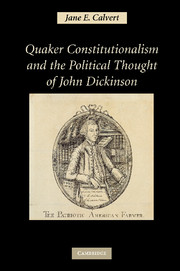Book contents
- Frontmatter
- Contents
- Acknowledgments
- Abbreviations
- Introduction
- I QUAKER CONSTITUTIONALISM IN THEORY AND PRACTICE, C. 1652–1763
- 1 Bureaucratic Libertines: The Origins of Quaker Constitutionalism and Civil Dissent
- 2 A Sacred Institution: The Quaker Theory of a Civil Constitution
- 3 “Dissenters in Our Own Country”: Constituting a Quaker Government in Pennsylvania
- 4 Civil Unity and “Seeds of Dissention” in the Golden Age of Quaker Theocracy
- 5 The Fruits of Quaker Dissent: Political Schism and the Rise of John Dickinson
- II THE POLITICAL QUAKERISM OF JOHN DICKINSON, 1763–1789
- Bibliography
- Index
- References
5 - The Fruits of Quaker Dissent: Political Schism and the Rise of John Dickinson
Published online by Cambridge University Press: 27 July 2009
- Frontmatter
- Contents
- Acknowledgments
- Abbreviations
- Introduction
- I QUAKER CONSTITUTIONALISM IN THEORY AND PRACTICE, C. 1652–1763
- 1 Bureaucratic Libertines: The Origins of Quaker Constitutionalism and Civil Dissent
- 2 A Sacred Institution: The Quaker Theory of a Civil Constitution
- 3 “Dissenters in Our Own Country”: Constituting a Quaker Government in Pennsylvania
- 4 Civil Unity and “Seeds of Dissention” in the Golden Age of Quaker Theocracy
- 5 The Fruits of Quaker Dissent: Political Schism and the Rise of John Dickinson
- II THE POLITICAL QUAKERISM OF JOHN DICKINSON, 1763–1789
- Bibliography
- Index
- References
Summary
During the heyday of Quakerism in the mid-eighteenth century, the practical necessities of governing began to challenge the applicability of Quaker theory. Even as their politicking was unifying the province, Quakers' own theologico-political cohesion was beginning to falter, and the dual ethic of unity and dissent that they had encouraged began to evolve in unexpected ways. Attributable mainly to John Kinsey's machinations in the 1740s, during the 1750s and 1760s, political Quakerism, or, more accurately at this point, Quaker-informed political behavior, began to separate into three roughly defined categories. These I will call “withdrawing,” “radical,” and “traditional.” The main point of difference among them concerned the peace testimony in all its facets.
The withdrawers, whom most historians have taken to represent all of Quakerism from 1765 on, adopted Kinsey's restrictive interpretation of the peace testimony and, in what is known as the “Quaker Reformation,” rejected any dealings with war. Contrary to Kinsey's brand of politics, however, they went further and also rejected office-holding and civic agitation as incompatible with their principles. Far from being a “conservative” sort of Quakerism, as we might be tempted to call it, this was rather a new form that departed from the beliefs of the founders and historic theologico-politics of Quakers. In searching for a renewed purity in their Society, these Friends were coming to emphasize the unity of Quakerism against the outside world.
- Type
- Chapter
- Information
- Publisher: Cambridge University PressPrint publication year: 2008



